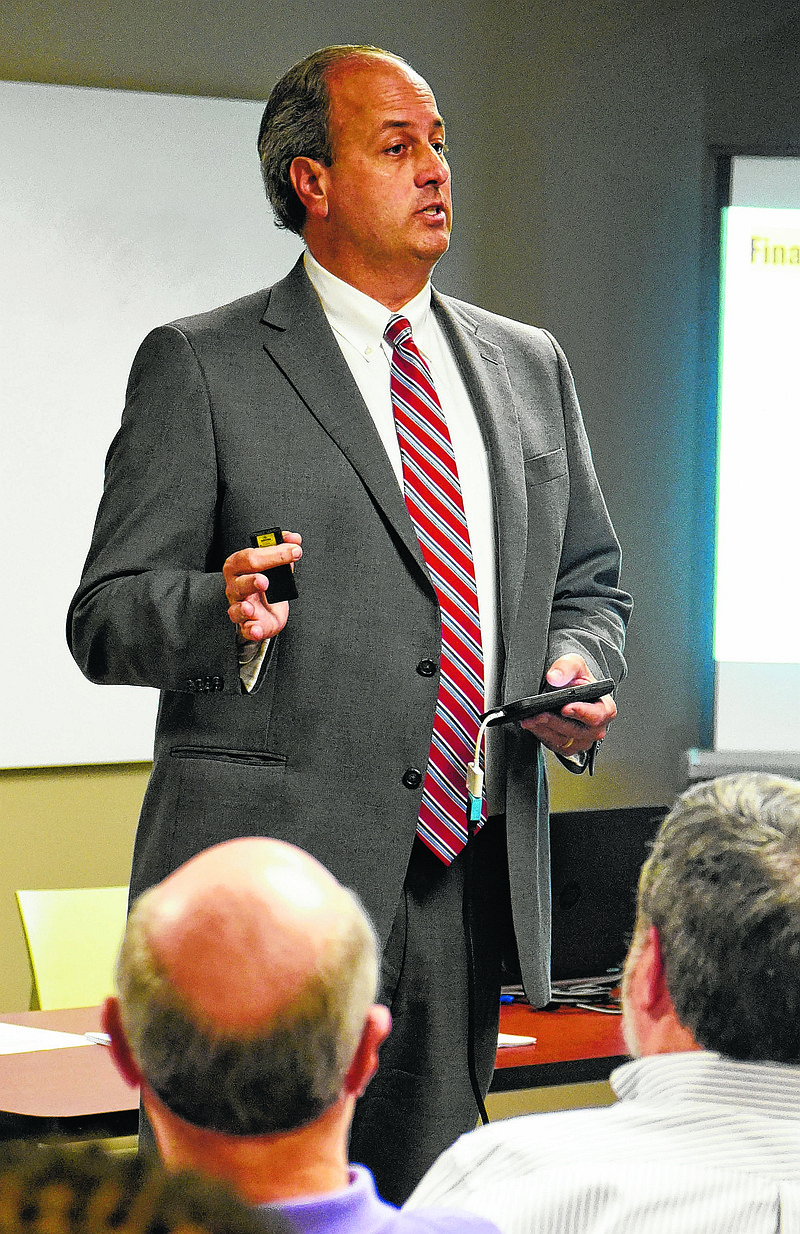Nearly three weeks after a public accusation that his budget is illegal, Walker County Commissioner Shannon Whitfield said he still doesn't know what the problem is.
At the beginning of a hearing Oct. 5, Clerk of Superior Court Carter Brown said he and the other county constitutional officers objected to Whitfield's budget as well as the process by which it was formulated.
"We bring into question the legality of the process you're following to adopt this budget," Brown said.
He then left the meeting, announcing he had "some other matters I need to attend to." Since then, he has been quiet.
After a special called meeting Oct. 20, Whitfield said he has not heard from Brown or any of the other constitutional officers: Probate Court Judge Christy Anderson, Tax Commissioner Carolyn Walker and Sheriff Steve Wilson.
Whitfield said he didn't understand what the problem might be. State law requires him to hold three public meetings if he intends to raise taxes; he held five. Each lasted about three hours, with Whitfield recounting the history of the county's debt.
He didn't publicly release his budget until about 30 minutes before the Oct. 5 hearing, but when he did, the document was 73 pages long, with line items for each department. Under former Commissioner Bebe Heiskell, the county's budget was about three pages long.
"We've been more transparent than [the county] has been in the last 16 years," Whitfield said. "We held more public meetings. We've given a line-item, detailed budget. If there's any other questions about the budget or the process, they're going to need to come forward with that."
After last Friday's meeting, Brown told the Times Free Press, "At this point, I have nothing to say to the media."
Wilson said, "I cannot speak to that matter currently."
Overall, county department heads requested about $27 million. Whitfield's budget spends $27.4 million, but $4.5 million is going to pay down county debts. Minus the debt payment, Whitfield's general fund spending of about $22.9 million for the 2018-19 fiscal year is about $2.5 million shy of what the department heads requested.
The total money set aside is about in line with what the departments spent in the 2016-17 fiscal year, according to Whitfield's budget. But the figure for the most recent year is misleading.
The fiscal year ends Sept. 30; the budget lists money spent through Oct. 5. When interviewed last week, Whitfield said the county is still receiving bills for county spending in September. This means the total amount of money needed was actually higher than the county's budget shows.
How much higher? That's not clear. But Wilson said the sheriff's office had about $300,000 in unpaid bills when Whitfield presented the budget Oct. 5.
Wilson expects the sheriff's office spent about $7.7 million total last year. This year's budget also sets aside about $7.7 million. But the sheriff requested about $8.6 million, 10 percent more than he got.
Wilson said he made the same request in Heiskell's final year, only to be rejected. Wilson wanted $300,000 worth of new patrol cars, $200,000 in salary increases, and extra funding for inmate meals and inmate medical expenses.
Next door, Catoosa County's public safety fund is $9 million. And Wilson said his deputies have to cover more space.
"We're at bare bones, pretty much," he said.
Of the budgets for the other constitutional officers: the clerk of Superior Court received $566,095, a 4.9 percent cut from last year and an 18.8 percent cut from the requested budget; Probate Court received $264,360, a 3.3 percent increase from last year yet a 15.7 percent cut from the requested budget; and the tax commissioner received $1 million, a 5.1 percent cut from last year and an 18.5 percent cut from the requested budget.
Whitfield also is enforcing a purchase order rule this year. Department heads are free to make any purchases under $200. For anything above $200, they need approval from County Chief Financial Officer Greg McConnell. For anything above $5,000, they need approval from Whitfield. And for anything above $15,000, they need approval from Whitfield during a public hearing.
The commissioner said last Friday he will create a list of exceptions for some expenses. For example, Wilson will not need to go to a public meeting for approval if an inmate's hospital expenses exceed $15,000. The juvenile court judge will not need approval when he assigns an attorney for a child.
Last year, Whitfield said, county employees could buy anything under $500 without a purchase order.
"It was more of a suggestion, the way it was looked at," he said. " There was maybe a handful of departments doing that. [The] majority were not. There was nothing put in place to manage that or enforce that."
Email Tyler Jett at tjett@timesfreepress.com
